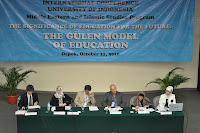 |
| Fethullah Gulen Conference |
In the poverty stricken country that hosts one of the world’s largest Muslim populations, the International Fethullah Gülen Conference opened its doors to scholars from around the world, and in particular from Southeast Asia, South Asia and Australasia, to discuss a most timely topic of “The Significance of Education for the Future: The Gülen Model of Education.”
There were speakers from 14 different countries, including renowned academics from Australia, Russia, South Korea, Japan, Bangladesh, India, Singapore, Malaysia, the Philippines, Turkey, Taiwan, Thailand and Senegal, as well as esteemed local speakers from Indonesia itself.
The conference was organized by the Fethullah Gülen Chair at the UIN Syarif Hidayatullah State Islamic University in Jakarta. The co-sponsors included the State Islamic University of Sunan Kalijaga Yogyakarta and University of Indonesia in Jakarta.
The main goals of the Gülen chair are to promote peace in the world and contribute to a peaceful coexistence for adherents of different faiths, cultures, ethnicities and races. To achieve this, the chair encourages everyone to be respectful to the environment and to all creatures’ right to exist, to believe in the sanctity of human rights and democracy and to use all available means to make this coexistence possible. To this end, the chair promotes education and the exchange of information, opinions and expertise, with a special focus on including a diverse a range of viewpoints.
It is in line with these broad aims that the conference committee was established in early 2010 to discuss the significance of education and the future and the Gülen model of education.” Committee members included experts and professors in interdisciplinary fields of education, Asian and Islamic studies and philosophy, and was headed by the Gülen Chair, who was also the convener and secretary for the committee.
The conference began with the opening ceremony at the lavish Gran Melia Hotel, with special guests including state officials, ministers, media representatives, university rectors and chancellors, and of course, international speakers and participants from all over the world.
During his opening speech former Indonesian Education Minister Professor Yahya Muheimin, in describing the historical connection between Turkey and Indonesia, stated, “We used to sing Ottoman Turkish songs in madrasahs, not knowing they were Turkish in 1950s.”
Gülen-inspired schools were applauded by many Indonesian officials and ministers who welcomed the schools as the present fulfillment of a great historical connection between the two nations. He also recounted the historical link between Indonesia and Turkey stretching back to Ottoman times where Sultan Süleyman sent cannons for Indonesian Muslims to defend themselves from the Dutch.
The two-day intensive discussions on Gülen’s educational philosophy started off in Jakarta’s main State Islamic University and continued the following day at the University of Indonesia.
Participants tackled a plethora of issues related to the administration and structuring of education, together with the various missions, aims and philosophies of educational systems. Issues such as the assimilation of new approaches into education, as well as the connections between the generation of information and a new paradigm for education, and how higher education in the 21st century can be both locally and globally innovative, were all raised as vital questions to be explored.
The conference also provided a meeting ground for scholars, educators at all levels, NGOs and policymakers.
 |
| Fethullah Gulen |
Professor Leonid R. Sykiainen from the State University-Higher School of Economics Moscow stated in his presentation, “People today do not connect Islam with religion or spirituality, Islam today has been over politicized and is deemed purely political.”
He further concluded that the reason for the success of Gülen’s educational ideal is the “total avoidance of politics and a complete emphasis on Islam as a rich spiritual tradition and a way of life and living.”
“Fethullah Gülen stresses that modern education needs to be a combination between science and religion as well as an avoidance of politicization. It is the only way for education to become the best preparation for dialogue and mutual understanding. Even more, without education our world will not be democratic and tolerant,” he said.
The conference was appropriately suited to this small yet highly populated archipelago, especially given Indonesia’s recent history which has been turbulent with challenges posed by colonialism, natural disasters, corruption, separatism, democratization and periods of rapid economic change. The future of this very diverse nation is therefore highly dependent on the educational success of the country, making the conference a pivotal beam of hope for the ethnically, religiously and politically diverse nation. The conference clearly highlighted that the schools provide a promising alternative future for a country that is constantly on alert from natural and man-made disasters.
As was mentioned on the last day of the conference, the future of Indonesia, and for that matter, the rest of the world, is dependent on correcting our thinking and perspectives that will eventually emanate into the socio-political life of the people and the nation.
Published on Today's Zaman, 04 November 2010, Thursday
